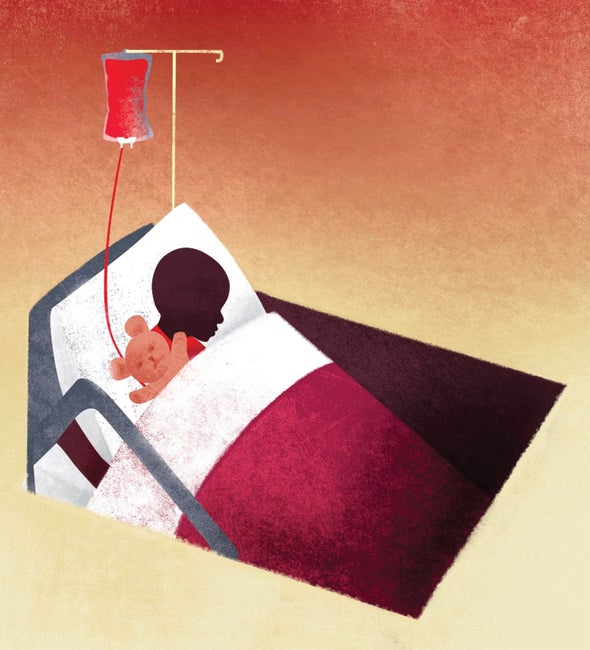Health Differences in Black Vs Other Minrity Babies
Black Children, too as Other Minority Kids, Fare Worse Than White Children in Common Surgeries
The reasons for diff patient outcomes may prevarication in implicit biases at the hospitals that treat them

A pandemic is a stress exam for guild, revealing not only hidden cracks in wellness systems just likewise broader social failings. A deep fissure further exposed by COVID is the long-standing inequity in the wellness and medical care of racial and ethnic minorities. The outbreak has shown that Black, brown and Ethnic adults in the U.Southward. are more medically vulnerable than other people because of factors such as a heavier burden of chronic diseases, limited access to care and the cumulative effects of racism. The care gap is so bad even minority children who are relatively good for you and have non experienced decades of discrimination fare worse than their white peers during common, straightforward operations. The questions for all of usa are: Why—and what can be washed about information technology?
First the facts. An abundance of studies has shown that Black children do worse than white children in surgery. More than complications and higher death rates have been documented in abdominal, cardiac, oncological and other types of procedures in Black children, and it isn't only because they routinely start off sicker. A 2020 written report in the journal Pediatrics past researchers at Nationwide Children'south Hospital in Columbus, Ohio, looked at the charge per unit of surgical complications and deaths in the 30 days after inpatient procedures for 172,549 Black and white children who were judged—by a standard medical rating system—to be in general good wellness. Problems were rare overall, just Black children were 18 percentage more likely than white children to have complications and more than three times every bit likely to die.
"We were surprised," says Christian Mpody, a pediatric epidemiologist and co-writer of the paper. "Nosotros know that the sicker you are at presentation, the more than likely you are to take complications. When we see a relatively good for you population, we should not see the disparity."
To investigate farther, Mpody and his colleagues zoomed in on one of the most common surgeries for children: appendectomy. They compared the rates of complications between Black and white children, examining the records of 100,639 procedures betwixt 2001 and 2018. In a paper published this October, they reported that the overall charge per unit of complications declined through the years, but the race gap scarcely narrowed. Blackness children ever were more probable to take complications, and the disparity held true whether kids had an intact appendix or a flare-up one—a probable indicator that the child was delayed in reaching the infirmary or receiving care. The departure remained when researchers adjusted for factors such as socioeconomic status and insurance coverage.
The ii studies advise that "in that location are some inside-hospital factors that play a function," Mpody says. Before studies hint that facilities may non exist treating all children as. A 2020 analysis of emergency section records found that Black children with appendicitis were less likely to be promptly diagnosed and to get timely diagnostic imaging than white children. A 2015 study showed they were also less probable to receive any medication for their abdominal pain. Such inequities may reverberate implicit and explicit racial bias on the role of staff, as well as structural racism embedded in practices at the facilities, says Monika Goyal, pb writer of both studies and an emergency medicine specialist at Children's National Infirmary in Washington, D.C.
Mpody's appendicitis report did more than size up racial inequality; information technology put a price on it. The study found that hospitals incurred college costs from dealing with complications in Black patients—a median of $629 more per child than for white kids. That ways hospitals could potentially save money past improving health care for minorities. "While the price argument feels sort of disgusting, we operate in a health-intendance system built on capitalism, and then it matters," says Rachel Hardeman of the University of Minnesota School of Public Health, who studies racial equity and reproductive health. She points out that hospitals routinely appoint in "continuous quality comeback" efforts, but they don't often prioritize health inequities every bit part of them. Hardeman says the economic argument made past studies such every bit Mpody's could brainstorm to change that.
Hardeman'southward ain piece of work suggests that preparation doctors and staff to reduce unconscious bias could help close the race gap in outcomes. Increasing the racial multifariousness of the medical workforce could as well aid. Her research—and that of others—shows the effect gap narrows dramatically when Black doctors treat Black patients. Black people make up thirteen per centum of the U.S. population but just 5 percent of doctors, a number that has barely budged despite diversity recruitment programs at medical schools. By hiring more diverse staff, amongst other efforts, hospitals could become places where all children have equal rights to go well.
This article was originally published with the championship "Unequal Surgery" in Scientific American 325, 6, 30 (December 2021)
doi:ten.1038/scientificamerican1221-30
Health Differences in Black Vs Other Minrity Babies
Source: https://www.scientificamerican.com/article/black-children-as-well-as-other-minority-kids-fare-worse-than-white-children-in-common-surgeries/




